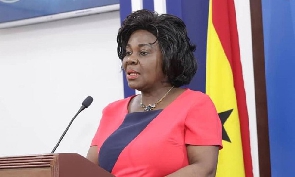Cecilia Abena Dapaah, Minister of Sanitation and Water Resources on Monday launched the Greater Kumasi Sanitation and Water Project, which seeks to strengthen environmental sanitation management and water supply in the city and its environs.
The World Bank (WB)-assisted project comprises four components and includes; increasing access to sanitation services in priority low income areas and also supporting the expansion of the water distribution network.
The four-year project has received US$125 million assistance from the WB towards its implementation.
Ms Cecilia Abena Dapaah, the sector Minister, during the launch at the Jubilee Park, Kumasi, said about 120 kilometer of pipelines would be laid, and 10, 000 new households would also be connected to the Ghana Water Company Limited (GWCL) water system.
This is expected to provide pipe-borne water to an estimated 150, 000 people living in the beneficiary areas - Kumasi, Asokwa, Oforikrom, Old Tafo, Suame, Kwadaso, Ejisu and Asokore-Mampong, she stressed.
Ms Dappah indicated that the Ministry was providing technical assistance to the metropolitan and other beneficiary municipal assemblies within the Greater Kumasi jurisdiction for the success of the project.
Among other benefits, the project would support the GWCL to improve on its operational efficiency through interventions necessary to address some challenges such as the reduction in non-revenue water losses.
The target is to reduce non-revenue water losses from its current level of 54 per cent to 40 per cent by the end of the project period.
Additionally, there are plans to improve sanitation services, including; wastewater and septic sludge management investments, liquid waste management and drainage and investment in bio-digester sludge processing plants.
Another key component of the project is to support the provision of 42, 000 household toilets and 150 school healthcare sanitation facilities for the beneficiary areas.
Ms Dapaah said the government would not relent in its efforts to invest in programmes and projects tailored to achieving the Sustainable Development Goal (SDG) Six (6) - ensuring access to water and sanitation for all.
The Minister advocated an attitudinal change in the lukewarm attitude towards environmental sanitation issues, and called on the citizenry to demonstrate seriousness in relation to those issues for their own wellbeing.
Mr Osei Assibey-Antwi, the Mayor of Kumasi, said the city and its adjoining municipalities had an estimated three million population.
By 2030, the population is estimated to reach 4.2 million, according to the Mayor, saying statistics from the 2010 Population and Housing Census indicated that nearly 40 per cent of the population in Kumasi relied on public and shared toilets.
Only 58 per cent have access to private toilet facilities, he added.
Mr. Assibey-Antwi said the provision of institutional and household toilet facilities was, therefore, an area where great efforts were required “to help the population gradually move up the sanitation ladder and shift from the practice of open defecation.”
The programme was chaired by Oheneba Owusu Afriyie IV, Apagyahene, representing Asantehene, Otumfuo Osei II.
Other dignitaries included; the Minister of Education, Dr. Matthew Opoku Prempeh, Madam Patricia Appiagyei, the Deputy Minister of Environment, Science, Technology and Innovation and the Municipal Chief Executives (MCEs) for Oforikrom, Kwadaso and Suame.
The World Bank and Ashanti Regional Coordinating Council were also represented.
General News of Tuesday, 24 November 2020
Source: GNA













